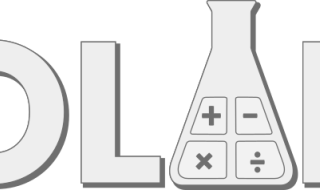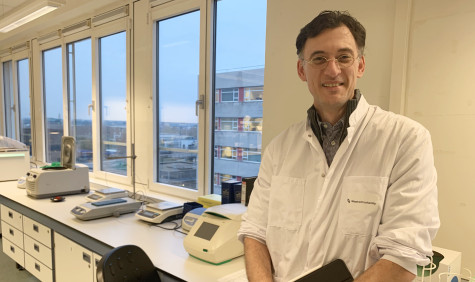It is enormously satisfying when you notice that they are both enthusiastic about the tool and achieve higher grades in their tests.
Instant feedback during online practice of lab maths skills
Biomedical science, health science and medicine students have all had chemistry in their subjects. With that knowledge, they should be able to make simple lab calculations. The reality is that their basic knowledge lags behind what is needed in practice. Maastricht University developed an online tool that allows students to practise their lab calculation skills.
Maastricht University therefore developed an online tool that allows students to practice their lab calculus skills called OLaF, which stands for Online Laboratory calculus with automatic/instantaneous feedback. The spiritual father of this product is Herman Popeijus, associate professor and testing expert. For years, it has been a thorn in his side that students have such poor maths skills. Even simple things, like converting grams to milligrams, sometimes go wrong. It leads to him, and many of his colleagues, spending more time during a practical answering questions in this area than on the essence of the subject in question. "I had wanted to develop an online tool for a long time, but budget is often an issue. Then I applied to the Open and Online Education Incentive Scheme at SURF. This idea fitted in perfectly with that," Popeijus says.

High rating
The result is beyond expectations. Popeijus noticed almost immediately after introducing OLaF that students had far fewer maths questions during a practical. "As a result, they learn what they need to learn during those lessons again, without being distracted by other things," he says. "It just saves us teachers a lot of valuable teaching time." Surveys of students show that they are as enthusiastic as their teachers. About 85 per cent feel that OLaF helps them learn maths. The same percentage would recommend OLaF to fellow students. 70 per cent even enjoy practising this way. In the free comment boxes, the team regularly receives feedback such as: 'OLaF helped me pass the exam'.
Basic knowledge in order
Making exercise fun and engaging was not his first goal, he says. "Because it is about practising basic skills. This practice is very necessary given the entry level. After all, students are trained with us to soon set up an experiment or administer medication. If they make a mistake in diluting a liquid, it can have serious consequences for experimental outcomes, either for the subject being treated or the patient. On top of that, during training, it is a waste of time spent on practicals if students get stuck right from the start because they lack certain basic knowledge."
Direct feedback is great added value
He came up with the idea of an online tool because lab maths skills involve applying rules. And if you can easily automate something, it's that. Moreover, you can easily anticipate what mistake a student has made when he gives an incorrect answer. "Because it's not much more than multiplication, division, addition and subtraction," says Popeijus. "If a student has multiplied when he should have divided, you see it in the answer. That way you can give immediate feedback: you probably did this and this."
That instant feedback is OLaF's biggest added value. "Previously, students would ask for practice tests. Then they could see in the answers that they had done something wrong, but they often didn't know exactly what. Now they get immediate feedback so they get it right on the next task," he says. He developed OLaF together with Professor Köhler (Professor of Anatomy) and Koos van der Kolk of the e-learning company LabBuddy. Van der Kolk ensured that the sums and feedback instructions Popeijus and Köhler developed were converted into software.
It just saves us teachers a lot of valuable teaching time.
Widely applicable concept
This success has not gone unnoticed. Leiden University also wants to implement OLaF; several universities have already asked for more information. Other departments at Maastricht University are taking inspiration from Popeijus to develop a similar tool for training skills needed in other fields. He is willing to provide anyone with advice. "Because this concept is very widely applicable. However, setting up the tool within an organisation does require the necessary e-learning expertise. And, of course, it takes time to develop a tool. But on the other hand, implementation in education requires limited energy. You just need to make it available. The need among students to practise their maths skills is so great that they start using such a digital tool of their own accord. It is enormously satisfying when you notice that they are both enthusiastic about the tool and achieve higher grades in their tests."
His tip is therefore: take stock of which skills your students lack and consider how an online tool can help train those skills. "Put a good team together, invest the time and the benefits will be great."
Getting started yourself?
Want to get started with the materials developed in this project? Read more about Online Laboratory calculus with automatic/instantaneous feedback (OLaF).
More about the Incentive Scheme for Open and Online Education
This project was created with help from the Open and Online Education Incentive Scheme. View more results from the scheme's projects.
